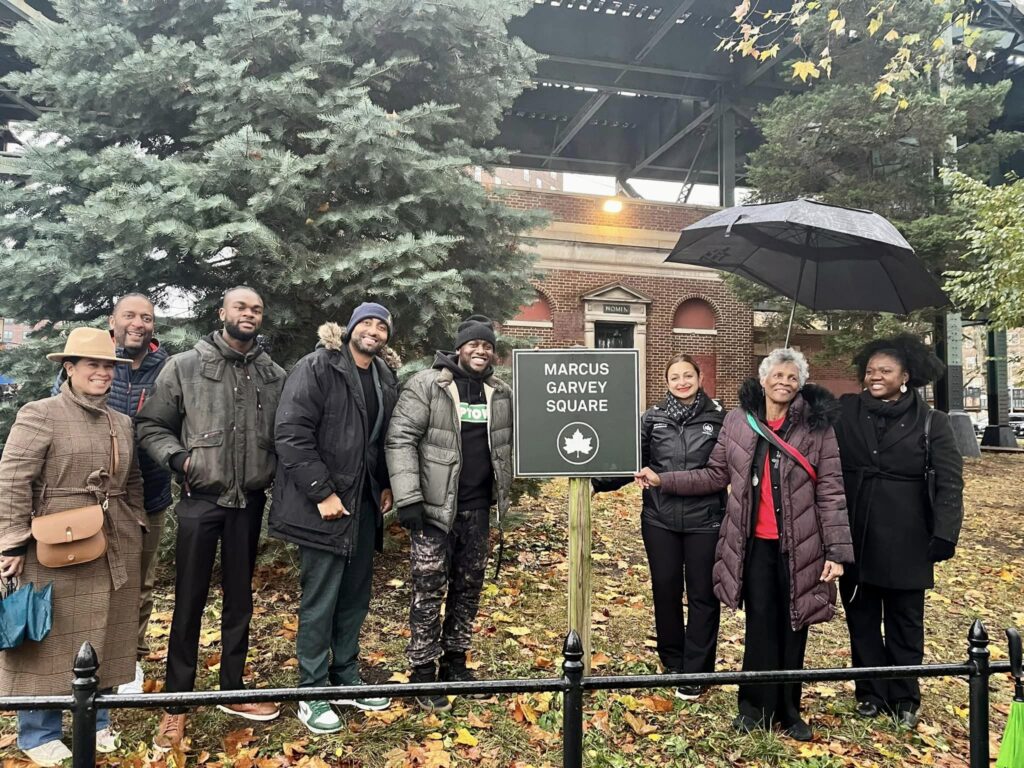
Photo courtesy of Amanda Medina
*The following article is a slightly extended version of the one that appears in our latest print edition.
Huddled under raingear, tents, and umbrellas, a proud group of Bronx residents, including some of Jamaican/Caribbean heritage, gathered at White Plains Road and East Gun Hill Road in Olinville under the East Gun Hill Road elevated subway tracks and the day’s drizzle on Friday, Nov. 22, to see a long fought campaign by community activists come to fruition with the renaming of Williamsbridge Square to Marcus Garvey Square.
According to the National Archives, Marcus Mosiah Garvey Jr., born on August 17, 1887, in St. Ann’s Bay, Jamaica, was the founder of the Universal Negro Improvement Association (UNIA) which aimed to achieve Black nationalism through the celebration of African history and culture.
Through the UNIA, Garvey pushed to support the “back to Africa” movement, and created the Black Star Line to act as the Black-owned passenger line that would carry patrons back and forth to Africa. He also fostered restaurants and shopping centers to encourage Black economic independence.
In 1922, Garvey was convicted of mail fraud charges and sent to Atlanta Federal Penitentiary, but President Calvin Coolidge commuted his remaining time amid protests from Black Americans. In 1927, he was deported from the United States to Jamaica, where he continued his UNIA work and political activism before moving to London in 1935. He died on June 10, 1940, after multiple strokes. His ideology has influenced members of the Nation of Islam, the Black Power Movement, and the Rastafari movement.
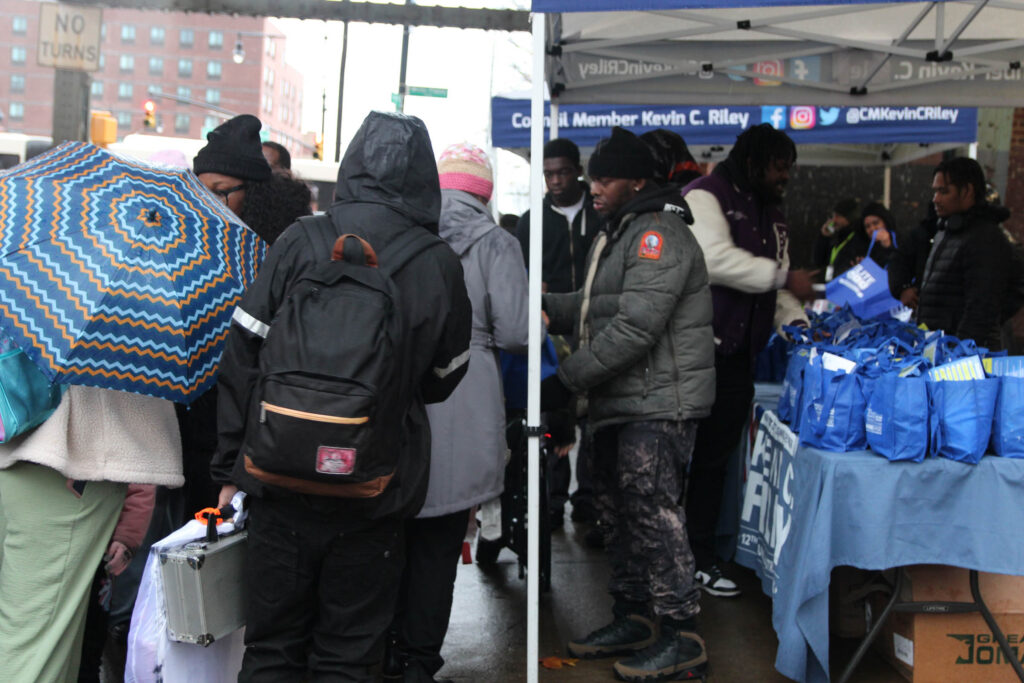
Photo by Síle Moloney
Present for the ceremony, among others, were NYC Parks Bronx Borough Commissioner Jessenia Aponte Salamanca, State Sen. Jamaal Bailey (S.D. 36), City Councilman Kevin Riley (C.D. 12), Bronx Rev. Margaret DeMosh, Community Board 12 (CB12) Chair Beatriz Coronel, CB 12 District Manager George Torres, CB 12 Housing Chair Robert Hall, Sadie Campbell from the Jamaica Progressive League, First Deputy Commissioner of Parks Iris Rodriguez Rosa, and various representatives from the Jamaica Benevolent Arm & Cultural Center, Jamaica Progressive League, Catholic Charities Archdiocese of New York, and NYC Department of Parks and Recreation.
After using the occasion to wish Rodriguez Rosa a happy birthday, Aponte Salamanca said of the Square, “This space has been under the jurisdiction of NYC Parks since 1926. Nearly a century later, the neighborhood has evolved and the community’s voice is being heard as we rename this area in honor of the late Marcus Garvey.”
Aponte Salamanca said the community had followed Garvey’s own words, “Lose not courage, lose not faith; go forward,” in advocating tirelessly for the square renaming, which she said was not an easy task. Of Garvey, she said, “He was considered the founder of the ‘Black is beautiful’ idea. Garvey’s cultural movement continues to have a lasting impact on today’s society. Hence the significance of this ceremony.”
For her part, the reverend gave thanks for the rain amid the recent brush fires in the TriState area and thanked all those who had gathered for the ceremony, blessing the elected officials and citizens, and all who were instrumental in bringing about the square renaming. “Because of the work of these people, each and every one of us can stand here and recognize the work of Marcus Garvey,” she said. “Bless us and comfort us, strengthen us so we can continue to work together in this community, especially in The Bronx, so we can see the change that we wanted to see here in your place, in your community, in our neighborhood.”
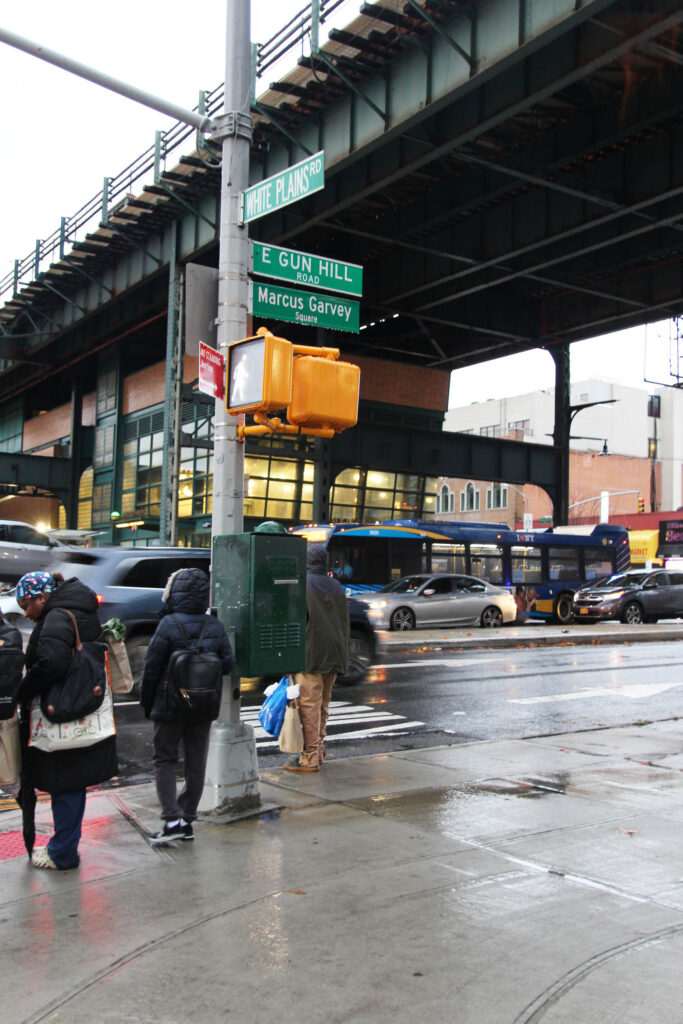
Photo by Síle Moloney
For his part, Riley said that since 2006, as he was starting his freshman year in college, the elderly Campbell, who he described as “this wonderful, beautiful woman behind me” had been trying to get the square renamed. He said she and others continued their efforts once he was elected to the city council and he thanked them “for championing the values of empowerment, education and social action.”
The councilman, who represents the Bronx neighborhoods of Wakefield, Baychester, Eastchester, Olinville, Edenwald, Williamsbridge and Co-op City, added in part, “We figured out that we had to pass a local law in order for it to change, and that’s why we’re here today because we want to celebrate Marcus Garvey.” To Campbell, he said, “We wouldn’t be here today without you.”
Riley said the renaming not only honored a towering figure in Black history, but also celebrated the rich, cultural legacy of the community, deeply rooted in Caribbean heritage and resilience. “We are creating a space that not only preserves history, but also inspires future generations. I stand on the shoulders of giants and advocates that thank you all for paving the way for moments like this.”
Riley, whose office organized a food giveaway in advance of Thanksgiving to coincide with the event, said Garvey reminded present day residents that a people without knowledge of their history, origin, and culture were like trees without roots. “Today we honor his legacy by rooting his name and the vision here in The Bronx, our home, that has long been a beacon of Caribbean pride,” he said.
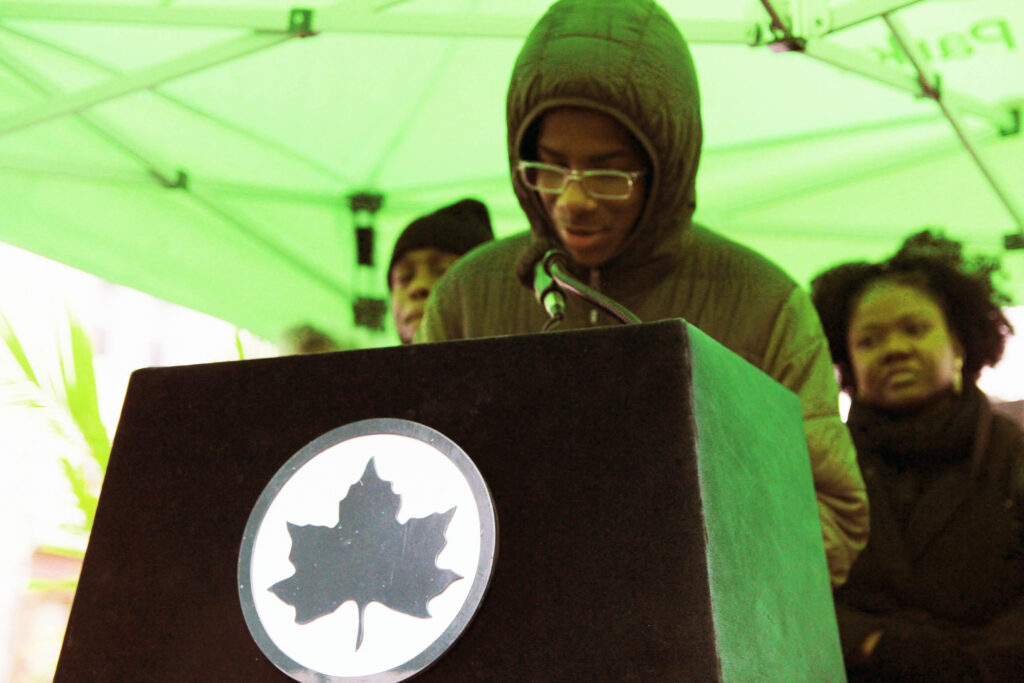
Photo by Síle Moloney
“The square is more than a symbolic act,” the councilman added in part. “It’s a call to action for all of us to continue uplifting our community, preserving our history, and celebrating the vibrant diversity that defines us. Let this space serve as a reminder of the power of unity, culture and community action as we move forward together.”
Later, Bailey said the fact that so many had ventured out under the rain for the occasion spoke volumes about the community. “Rain will not do anything but make us grow,” he said. “It’s not going to make us wash away. They tried to bury us, but they didn’t know that we were seeds and we continue to grow.” The senator, who is also chair of the Bronx Democratic Party, also paid tribute to “a young lady named Sadie Campbell.”
The senator, who represents the Bronx neighborhoods of Wakefield, Woodlawn Heights, Williamsbridge, Eastchester, Pelham Gardens, Olinville, Parkside Housing Project, Edenwald, Co-Op City, and Baychester, as well as parts of Westchester County, said Campbell had also previously advocated for the creation of a COVID memorial after the pandemic, adding that it was due to her community advocacy that she had been named New York State Senate Woman of Distinction this past year. Amid cheers from those gathered, the senator also paid tribute to the “most vibrant Caribbean community in all of New York City.”
He acknowledged that there were many who may not even know who Marcus Garvey was or what he did. Quoting the famous lyric, “Emancipate yourself from mental slavery; None but ourselves can free our minds,” from Bob Marley’s “Redemption Song,” Bailey said, “That wasn’t Bob Marley. He was paraphrasing. We know that, but many of the people that were listening may not have known that that was Marcus Messiah Garvey.”
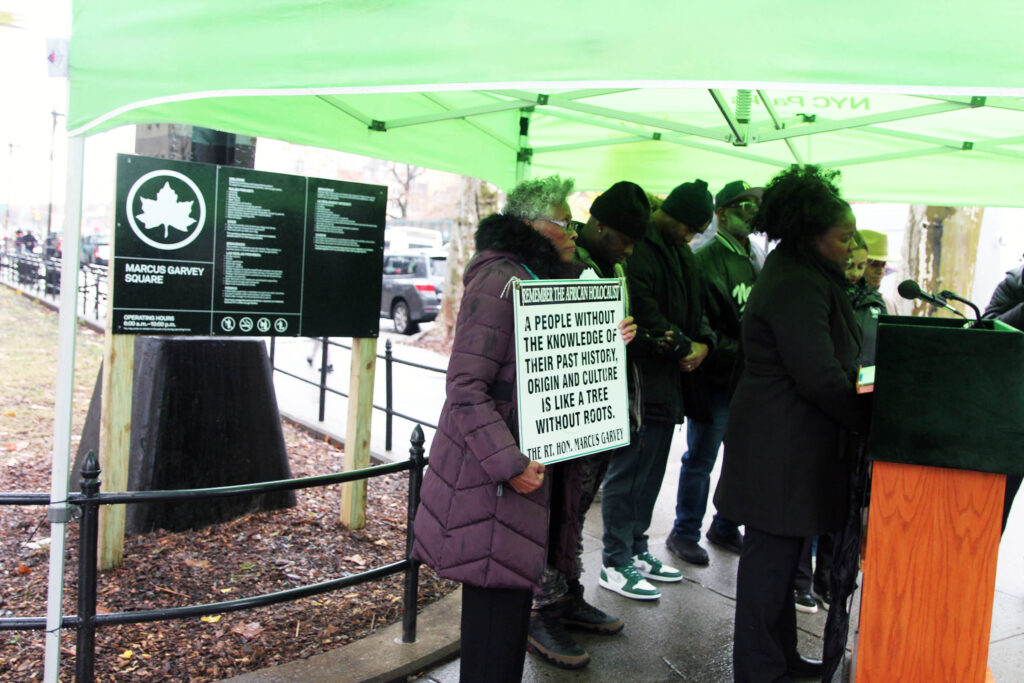
Photo by Síle Moloney
Bailey said it was very important to know what Garvey had done for both the Caribbean and African American non-Caribbean diaspora. “It’s critically important that me, somebody that comes from a non-Caribbean background, can also ascribe and point to the teachings of Garvey as a focal point in our community,” he said, adding, “You’ve heard me often say, ‘What unites us is greater than what divides us.’”
The senator gave a few culinary examples before adding, “Garvey wanted us to know that we are one people and the great thing, out of the beautiful country of Jamaica, out of many, we are one people, and our reality is we are one people today. We are one people in the future, and this square is a testament to that.”
For her part, Coronel said in part, “I was born and raised in Manhattan, where I saw the disparities at a very young age. My daughter is Jamaican, and so in 2017, when I was looking at where can I get her rooted in her ancestry and culture, I decided that this neighborhood was probably where we should invest, and so we did.”
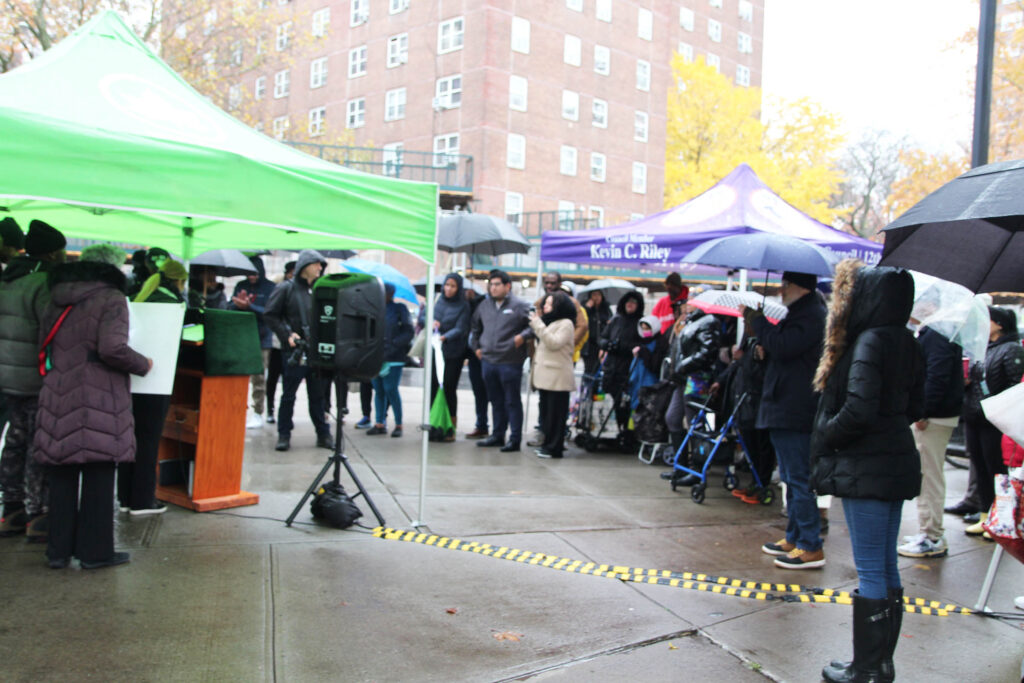
Photo by Síle Moloney
Coronel said now her granddaughters are also Jamaican, Ecuadorian and Dominican. Adding that she worked in the mental health field, she said, “I think it is important that we do center our kids and that they’re rooted. One of the biggest risk factors is that they don’t have identity. They’re not learning about their history in the schools and so, it is up to the community to teach them their history and their roots and strengthen them and have them harvest from all the power of their ancestors.”
For her part, Campbell later said she had been asked in advance of the event if there was going to be tents and food, and if the event was still going ahead due to the rain, and she said she told them she didn’t know. “I am so proud of you all that you’re here in this rain!” she said. Accompanied by her daughter and grandson, Campbell talked about the fact that there was already a street sign in the area named in Garvey’s honor, but jokingly added, “Did the city know that a square has four sides?”
Of Riley, who she referred to as her other son, she said, “This young man, he made sure that it’s on the four sides! I’m so pleased and proud to be here at this moment. At one time, I was getting a feeling that we were just alone but now, when I look around and I see you all, I say, ‘Thank you! Thank you! Thank you!’”
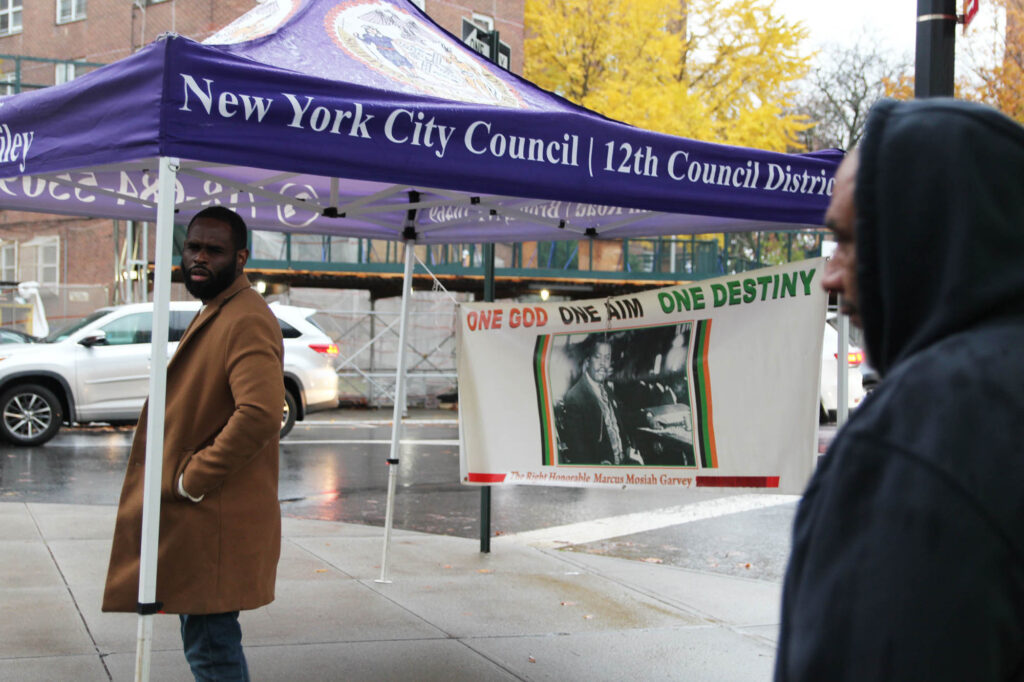
Photo by Síle Moloney
The Black Power movement went on, in turn, to influence other civil rights movements in other parts of the world, including in Northern Ireland. When Northern Irish civil rights activist, Bernadette Devlin, was symbolically offered a key to The City of New York during a visit in 1970, she gave it to the Black Panthers “as a gesture of solidarity with the Black liberation and revolutionary, socialist movements in America,” saying, “To all these people to whom this city and this country belong, I return what is rightfully theirs, this symbol of the freedom of New York.”
After the ceremony, we spoke to some of the other attendees. José Richards, who said he is of Panamanian and Jamaican origin, said in part, “For what this man has done for us as a people, there is no way we should ever let his memory die. We want to get the word out before we go through the ancestral gates…[..] because we are tired, we are pooped now. We are leaving them in a world that is so uncertain. We don’t know what’s going to happen tomorrow.”
Meanwhile, Sharon Hamilton-Pearson said, in part, “The roots that these… this generation is leaving, my generation, and the ones coming behind me, unfortunately, they’re not getting the message….but we’re going to stay busy with her.. [inaudible].”
Towards the end of the Marcus Garvey Square renaming ceremony, Campbell’s grandson, Dylan, recited a poem he had written in honor of the occasion. It read as follows:
“The honorable Marcus Messiah Garvey says
each race should be proud and stick to its own
and make the best of what they are and always should be shown,
making sure to not trample on the civil liberties of others,
guided always by honesty, peace, love and harmony,
remaining firm in your convictions that might is not always right.
Be bold, be brave, and stand on your own footing,
making sure that one-sided justice will never prevail.
Black, Yellow, or White will reside with dignity and in safety.
Black people, you have been tested more vigorously than all,
While the honorable Marcus Garvey has set the stage.
Follow his principles, and you’ll surely overcome.
We have a beautiful history of our exploits, bold and brave.
If we pursue, our joy will be restored, and the world will be astonished.
Friends, are you ready? Let’s get to work.”




